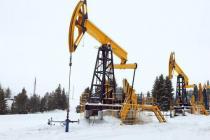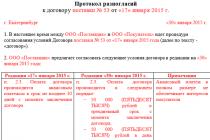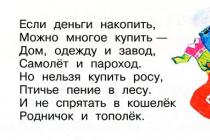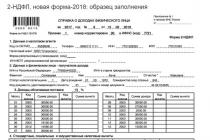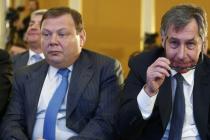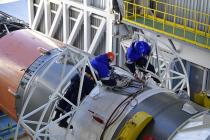Norway with a population of 4.5 million people covers an area of about 323 thousand km3, which is equal to 7 countries like Estonia, but, as the people say, the spool is small, but expensive.
Norway is a country where no one travels with security, no flashing lights, no corruption, where night operas are staged in the royal palace in Bergen, and in the summer there are performances on the streets, the king who appoints and removes ministers (the government has 7 ministers and one prime minister). minister) and provides a park in front of the palace for everyone, asking only to fence off a small place with a transparent net for their solitary walks.
Norwegians are driven by a sense of equality. This approach is the cause and effect of the use of the economic levers of state power.
Even at the beginning of the 20th century, Norway was a “fishing province” with a developed shipbuilding industry that reached a high technological level. Opening in December 1969 (simultaneously with Russia) of the first oil field Ecofisk completely changed the situation.
" The personal account of each Norwegian receives deductions from the received profit from oil revenues.
Oil is declared the property of the people, like everyone else Natural resources countries. Money from oil revenues goes to social programs and the Commonwealth Fund. And Norway gradually began to turn into one of the richest countries world, where GDP per capita reaches 40 thousand dollars. Over 30 years, Norway's income amounted to 454.5 billion dollars.
Today, the oil and gas industry provides 20% of Norway's GDP. There are 60 oil and gas fields in the North and Norwegian Seas, and 136 more are on the way. The share of income from oil and gas exports in total export income is 45%.
The personal account of each Norwegian receives deductions from the received profit from oil revenues. To date, these deductions amount to more than $100,000 for every Norwegian. For each child, at birth, a bank account is opened, which receives at least 3 thousand dollars of income from income tax.
" Government subsidies provide high level medical care (surgeries, treatment in hospitals is free).
Medical facilities in Norway are predominantly state or municipal, and state subsidies for them provide a high level of medical care (surgeries, treatment in hospitals are free). And no special hospitals.
If yesterday King Harald V was lying in the hospital ward (reluctantly, the head physician allowed the policeman to be on duty at the door, otherwise the patients tortured the king with autographs), today an ordinary hard worker lies there.
The king is satisfied with what his subjects enjoy. Just because it's enough. The country has the most powerful social structure medical services for the older generation (nurses, doctors, nursing homes). Nursing homes represent per person one-room apartment or a cottage, each patient has a belt with a button to call a nurse, which appears instantly. There are societies of patients who monitor the quality of treatment.
Education is free. Norway has the highest cost per student in the world. The school system operates with the active participation of parents in the education of children: schools recommend, parents decide what is the best offer for students (from the age of 7 children go to grade 1, education is 9 years old, further education is voluntary from 16 to 19 years old), schools give serious teaching of computer science and English, (all Norwegians know English very well), form a humanistic worldview of non-violence, tolerance, love for nature, diligence. And the Norwegians do not hold hard work. Many Norwegians, working in their profession, are engaged in fishing or running a family farm.
Agriculture is highly developed in Norway and is focused on meeting the country's domestic needs for food through family farms. It is based on animal husbandry, which fully covers the needs of the country's population in meat and dairy products. The main share of vegetables and fruits is grown in such quantities that it even allows the supply of cherries and strawberries to Western Europe (and this despite the fact that 200,000 farms cultivate 3% of the land).
" Contributions to the Oil Fund are made at a high material level of the population and the state provides its citizens with great social benefits
In order to smooth out fluctuations in income from the sale of oil and gas and, most importantly, to finance the growing costs of paying old-age and disability pensions, the State Oil Fund (NGPF) was created in Norway.
By compensating for the decline in oil and gas reserves with the financial activity of the NGPF, the government reduces the dependence of the country's economy on the export of raw materials. The State Oil Fund of Norway functions in the long term as a savings fund, and in the short term as a stabilization fund.
Contributions to the Oil Fund are made at a high material level of the population and the state provides its citizens with great social benefits: before taking care of future generations, it is necessary to create decent conditions for the living.
In Norway, all income flows into the budget. And only then they decide to transfer part of the money to the account, and only if the state budget is reduced to a surplus: the amount of deductions is determined annually in the process of approving the budget by parliament. The maximum annual transfer of budget funds reaches 6% of GDP.
Formally, the Norwegian State Oil Fund is an account in Norwegian kroner at Norges Bank, owned by the government of the country. Under Norwegian law, Norges Bank can only invest in foreign securities, their type and in which countries you can invest money is determined by the government of the country.
" The most democratic monarchy in the world put the law above everything else, above religion and tradition. Unquestioning obedience to the law, starting with the first person of the country - the king.
Norway did not join the EU, as the people wished, who did not want to be combed with a common comb, coming out with posters at demonstrations against the EU, but the Schengen agreement is in force in the country, so you may not notice the border with Sweden: only the color of the flag will change and there will be other road markings.
The most democratic monarchy in the world put the law above everything else, above religion and tradition. Unquestioning obedience to the law, starting with the first person of the country - the king. In Norway, everyone must follow Norwegian law, including foreigners, although it may go against your usual tradition.
Order and organization is a way of life for Norwegians. Everything works fine: public transport, ambulance, industry, service (historians say that the main guarantee of success in the campaigns of the Vikings was their organization). There are no nouveau riches and oligarchs here who buy up castles and yachts all over the world - the Norwegians do not need this to assert themselves, they are not characterized by money-grubbing.
For four years in a row, the UN has ranked Norway in first place in the world in "human development".
The working day lasts 7.5 hours from 8 to 15.30. A lawyer receives 400,000 kroons per year, a cleaner 220,000 kroons (1 kroon - 4.5 rubles).
Strict state control over housing construction. Most of the loans are provided by the state housing bank, and the construction is carried out by companies with a cooperative form of ownership.
" Social security in Norway is amazing.
Due to the climate and topography, construction is expensive, however, the ratio between the number of residents and the number of rooms is quite high. Housing, consisting of 4 rooms with an area of 103.5 m3, accounts for 3 people. Approximately 80.3% housing stock belongs to those who live there individuals. Cost of 3 room apartment is 50-300 thousand dollars.
As a rule, only one of the spouses works in the family, the other is engaged in spiritual searches, self-improvement and raising children. From time to time they change roles.
Social security in Norway is amazing. The current legislation prescribes the payment of "family allowances" to the salary, taking into account the number of children.
All Norwegians, including housewives, receive a basic pension upon reaching the age of 65. Additional pension depends on income and length of service. The average life expectancy of Norwegians is 79-81 years. The average pension corresponds to 2/3 of earnings. The state guarantees all citizens, including housewives, the right to a 4-week paid vacation. In addition, families receive an allowance of $1,620 per year for each child under the age of 17.
" In Norway, the most low interest unemployment -1% and the most high benefits from 800-1500 euros (with full payment by the state to the unemployed of housing and communal services, transport).
Every 10 years, all workers are entitled to annual leave with full wages for training in order to improve skills.
Norway has the lowest unemployment rate -1% and the highest benefits from 800-1500 euros (with full state payment of housing and communal services, transport to the unemployed).
Unfortunately, those who come to work for work take advantage of this, stop working, sitting on the neck of the authorities social protection: they drink all day, complain of boredom and on Tuesday stand in line of declassed elements to receive bags of food, and first-class ones: cans of coffee, meat, fish, tea, biscuits, vegetables organized by the Blue Cross, stocking up for a week, except In addition, every evening, before closing, all stores remove all products from the windows, wrap them in plastic bags and, without closing the trash cans with a key, put all the products in the tank, which is used by lazy visiting workers ...
The fact that Norway was practically unaffected by the worst crisis since the Great Depression is primarily due to its special model economic development: the basis of which - the main role in the country's economy belongs to the state.
" Unlike Russia, the Norwegians proceed from the fact that natural resources, oil and gas are not property individuals, individual companies, but the whole society, and the future of the country depends on their reasonable use.
Exactly state structures control the fuel and energy complex that has made Norway the most prosperous country.
Unlike Russia, the Norwegians proceed from the fact that natural resources, oil and gas are not the property of individuals, individual companies, but of the whole society, and the future of the country depends on their reasonable use.
This is manifested in the fact that exploration and production of oil is under the control of the state, and from private, foreign companies Huge percentages (80%) are taken into state income. Occupying the 3rd place in the world in oil exports right after Saudi Arabia and Russia, Norway today is a powerful oil power, is the 7th oil producer in the world.
To increase the Oil Fund, funds are invested in government securities developed countries A: 50-60% to Europe, 20-40% to USA, 10-30% to Asia and Oceania. According to the results of one year alone, dividends on these securities and interest on deposits exceeded $3 billion.
Revenues from the activities of the oil and gas industry are invested in the state Pension Fund for the benefit of future generations.
Through the fund, a long-term placement of funds is made; it is a resource for reliable companies around the world. Openness is central to the foundation's activities. Every Norwegian can easily get information about which foreign stocks and bonds the money of the State Pension Fund is invested in.
It would seem that count dividends, but no, the Norwegians decided that their fund would focus on "ethical" investments, and for this they organized a special ethics council at the fund in September 2005. And they invited the professional philosopher Henrik Siza to work in it.
"
On the account of any of the Russians, the government does not put a single ruble. Neither in the time of Gaidar, nor in the time of Putin. The question is why the government of Gaidar, and then Putin, has not yet opened individual personal accounts every Russian?
As the 40-year-old professor himself admitted, at that time he could not distinguish stocks from bonds. But no one demanded from him knowledge of the intricacies of the exchange - there were enough specialists for this. Its function was to help orient the investment of the fund's money in those companies that are not associated with the production of weapons of mass destruction or other inhumane activities. "We don't want pensions based on blood money," say the managers of the State Pension Fund.
So due to non-observance of humane attitude towards nature and people, the fund sold shares of the Russian company Norilsk Nickel. Norway has adopted a "Code of Ethics" for the investment policy of the oil fund, which excludes from possible investment those companies that violate human rights, harm the environment, the basic principles of humanism.
Norwegians carefully protect all natural treasures, monitor the purity of air and water (Norway has to allocate huge sums for Russia to raise old sunken submarines and bury them, as well as pay for the proper storage of nuclear waste on the Kola Peninsula).
long term goal public policy in Norway is the transformation of the country into a rentier state in order to ensure that future generations can take advantage of the country's current oil wealth. Therefore, the Oil Fund is also called the "Fund of Generations".
Russia, following the example of Norway, created the Stabilization Fund, the Russian leadership has repeatedly stated about “investing in people”, but, apparently, the tasks in reality were different.
On the account of any of the Russians, the government does not put a single ruble. Neither in the time of Gaidar, nor in the time of Putin. The question is why the government of Gaidar, and then Putin, has not yet opened individual personal accounts for every Russian? The question is up in the air.
Therefore, until we change, until we very strongly and consciously want to get rid of the shameful Russian poverty the world around us will not change. The descendants of the Vikings changed themselves and made their beloved country prosperous.
UDC 330.15
Economic feasibility of distribution of oil rent
Annotation. The distribution of oil rent is a complex and controversial issue, and therefore is the subject of numerous discussions. The main goal in choosing the method of rent distribution is economic expediency. The article discusses the concept of oil rent as a particular type of natural rent, the mechanism of formation of oil rent, and also suggests options for its distribution between the state and certain categories of the population. The result of such a distribution of rent will be an improvement in the social indicators of the standard of living in the country.
Key words: rent; natural rent; oil rent; distribution of rent.
abstract. The distribution of the oil rents is a complex and debatable question for today and this question is about a lot of discussions. The main goal in choosing the method of distribution of the rent is the economic feasibility of a distribution. The article is about the oil rent as a special kind of natural rent, the mechanism of the oil rent, and offers options for the distribution of the oil rent between the state and certain categories of the population. The result of the distribution of rents will improve the social living standards in the country.
Keywords: rent; economic rent for natural resources; rent for oil; distribution of rent.
Silpagar E.Yu.,
student
Financial University * [email protected]
No one doubts that the Russian economy is based on raw materials and is largely based on the development of the oil sector. The oil and gas industry is the main source of income for the Russian economy. Doubts arise regarding the correctness of the distribution and spending of income received from the use of natural resources, namely, questions arise about the effectiveness of the distribution of natural rent (the article will discuss its variety - oil rent) resulting from the extraction and use of the country's oil resources. Some experts are in favor of the need for complete control of the oil industry.
government rent. Others adhere to the point of view according to which the oil rent is subject to distribution between the state and oil companies. Still others insistently talk about the need to transfer part of the oil rent to Russian citizens, referring to the successful long-term experience of other oil-producing countries.
Thus, the problem is complex, complex, and in order to solve it, it is necessary to take into account not only the very possibility of several options for the distribution of oil rent, but also such aspects as taxation of oil production, management of rental income, the goals for which rental income should ultimately be directed. and some others.
To begin with, it is worth deciding on the concept of natural rent and oil rent in particular. All income that the producer of the resource receives (the selling price of the resource or gross income producer), consists of two parts: normal income and rental income. Normal income is the sum of all costs incurred by the
Scientific adviser: Sevruk M.A., doctor economic sciences, professor of the department "Macroeconomic regulation".
the producer when extracting the resource, the cost of delivering it to the target market, and the normal profit. Rental income is the difference between gross income and normal income. In other words, rental income is the reward that results from owning a particular resource. Rental income becomes possible due to the existing uneven distribution of natural resources between countries.
By definition, rent is the difference between price and normal income, which in this case consists of three components: operating costs for oil production, margin and transportation costs
Consider the system of creation, distribution and use of oil revenues in Russia.
The creation and distribution of oil revenues occurs as a result of oil production and its supply to the domestic or foreign market. The basis for the generation of oil rent is the price of oil, which should consist of two general components: normal income (which should be sufficient to cover all the costs of extracting and supplying oil to the market and margin) and the actual oil rent.
The price of oil on domestic market in the very general view consists of the following components:
Operating costs for oil production;
Margin (profit);
Mineral extraction tax (MET);
Fare.
Adding the amount of the export duty to this list, we get the price of oil on the foreign market.
By definition, rent is the difference between the price and normal income, which in this case consists of three components: operating costs for oil production, margins and transportation costs. In other words, according to this scheme, the rental income is equal to the sum of the MET and the export duty. AT Russian economy both of these payments (MET and export duty)
completely withdrawn by the state. However, in practice this is not the entire volume of rent.
At this stage, consider the point of view according to which rental income from oil industry should be fully controlled by the state. The state receives oil rent in the amount of the MET and export duties (when oil is supplied to the foreign market), which are used to form federal budget and then spent on government needs. The experience of Norway is interesting, where the oil rent is also withdrawn by the state, and then goes to the implementation of social programs and to the Common Welfare Fund. This is due to the fact that oil in Norway is declared the property of the people, like other natural resources. At the same time, every Norwegian has a personal account, which receives a part of oil revenues, i.e. a certain part of the oil rent is distributed among citizens and is another source of their personal income apart from the main one.
In Russia, the situation is somewhat different: the oil rent is not completely at the disposal of the state. To understand this, it is necessary to return to the structure of oil price formation. We have already determined that the rent is presented in the form of MET and export duty. If we consider the movement of oil further, it is worth noting that after the sale of oil, the company receives revenue and, as a rule, profit. On this profit, the company pays income tax, which also falls at the disposal of the state, but do not confuse it with rent. Income tax paid by oil companies is not included in rental income. Since income tax is a tax on the company's activities, and has nothing to do with oil resources.
But it must be taken into account that oil companies use a number of tax breaks. This allows us to conclude: in Russia, oil rent is distributed between the state and oil companies. The question arises why part of the rent is not distributed among the citizens of Russia, as is the case in Norway?
To answer this question, first of all, it is necessary to calculate how effective and expedient such distribution will be. What income will a citizen of Russia receive from
oil revenues of the country and whether this income will be 100% of the proceeds from the sale of one barrel
positive? Let's try to find out. for oil distributed in the following way:
Let's say the average price per barrel is not 30% - the cost of production 1 barrel of oil;
ft 50 USD
lara 65 rubles). These 50 US dollars (3250 rubles) and co- and export duties (together amount to
set the proceeds oil companies. rank of oil rent); 2.61% - income tax
The average cost of 1 barrel of oil (not included in the oil rent) and
is 15 US dollars (975 rubles), or 10.46% - net profit oil company.
30% of revenue. severance tax on average is - The current system of taxation
no 902.3 rubles per barrel (13.88 US dollars), or the increase is ensured not only by the development of oil
27.76% of revenue. extractive industry of the country, but also enough
In addition to the severance tax, the oil company also pays a fair distribution of income. From each
and export duty. Its composition and methodology for a long barrel of oil to the budget in the form of oil
calculations are given in the Law “On customs rent, 56.93% of revenue is received, i.e.
reef". According to approximate calculations, from $ 50, 1850.23 rubles.
the United States must pay 14.59 US dollars (948.2 rubles), Such figures are obtained by assuming the pro-
or 29.17% of revenue. Even one barrel of oil is also subject to payment, while in fact
to the budget and income tax in the amount of 20% of the case, the volume of oil sales is much larger. Behind
profit (however, as noted earlier, in the non-first quarter of 2015, and only the total export
this value is not included in oil rent). total revenue was about $22.7 billion.
If the cost price is subtracted from the revenue, the United States, excluding sales in the domestic market.
severance tax, export duty and income tax, This means that the amount of oil rent received
then profit is obtained (424.5 rubles). naya by the state in the form of taxes and export
At the output we get real structure duties amounted to about 12.92 billion dollars.
revenues of oil companies (see figure). USA or 839.8 billion rubles.
Structure of proceeds from the sale of 1 barrel of oil, %
Let us assume that this rent will be distributed between the state and citizens in a ratio of 1:1, i.e. Russian citizens will receive half of all rental income. Then part of the oil rent, the share of all Russian citizens, will amount to 419.9 billion rubles. (the share of one person will be about 2871 rubles per year with a population of 146,267,288 people). Since oil rent revenues go to bank accounts citizens, then part of these incomes will annually be spent on opening (at the birth of a child) and servicing a current account. On average, the expenses for such current accounts will be 1320 rubles1, and the income per person will be 1551 rubles. provided that this income will not be taxed. Otherwise, if the dividend tax rate of 9% is applied, a net income per person of 1411.41 rubles per year (21.7 US dollars per year) is obtained, which is not comparable to the income that Norwegian citizens receive or the United Arab Emirates (about $5,600 per year).
When comparing rental income and the average monthly wage, we find that the rental income is only 0.35% of the average monthly wage (assuming that it is equal to 117.6 rubles per month (1411.41:12 = 117.6) with an average monthly wages in 2015 -33,240 rubles), i.е. rental income in such a distribution is insignificant and practically not noticeable.
The main reason for this difference in the amount of income from oil rent per person is big difference the population of countries (more than 146 million people in Russia, about 5 million people in Norway, about 6 million people in the UAE). Thus, it works out
well-known law of mathematics: the more eaters, the smaller piece of the pie everyone will get.
The distribution of oil rent between the state and citizens will not bring the effect that Russians expect when comparing Russia with others oil-producing countries. The only obvious result will be an inefficient redistribution of money that can be centrally used for general social or general economic purposes of the state and its citizens, for example, to finance social programs or programs for the development of certain sectors of the economy.
Another variant of oil rent distribution is also possible. It can be divided between the state and that part of the citizens who live in the mining regions, for example, in the Khanty-Mansiysk and Yamalo-Nenets Autonomous Okrugs. With this distribution, we obtain the following results of Table. one.
The table shows that the amount of oil rent for the KhMAO and YNAO per person per year significantly exceeds the amount of oil rent per person per year, calculated for the entire population of Russia, in absolute terms. However, the average salary in Khanty-Mansi Autonomous Okrug and YNAO differs from the average salary in Russia and amounts to 67,459.95 rubles. (KhMAO - 61,706.6 rubles, YNAO - 73,213.3 rubles). In this case, receipts from oil rent will amount to 21.8% of the average monthly salary in the Khanty-Mansi Autonomous Okrug and YNAO (provided that the monthly rental income is 176,234.91:12 = 14,686.24 rubles, and the average monthly salary in Khanty-Mansi Autonomous Okrug and YNAO - 67,459.95 rubles).
This distribution looks more expedient, but another one inevitably arises.
Table 1
Total population of Khanty-Mansi Autonomous Okrug and YNAO, pers. Receipts from oil rent
2 152 061 195 115,23 176 234,91
table 2
Distribution of oil rent between the population of KhMAO, YNAO and the state
The total number of pensioners and the unemployed, pers. Receipts from oil rent
Before taxation and current account expenses per person per year, rub. net income per person per year, rub.
45 623 000 9 203,69 7 055,36
the question is how fair such a distribution will be in relation to other citizens of Russia? After all, oil resources belong to the country as a whole, and not to its individual subject. In addition, part of the oil rent (part of the income tax) goes to the budget of the subject, which means that, as a rule, it is spent on the needs of the subject, that is, part of the oil rent indirectly reaches the residents of the Khanty-Mansi Autonomous Okrug and YNAO.
Another option for distributing oil rent is possible, when it is divided among those categories of citizens who really need it. certain period time. Such distribution will be more efficient and, no less important, socially justified.
By distributing oil rent among such categories of citizens as pensioners (including old-age, disabled, survivors, and some others) and temporarily unemployed, the state will provide them with the necessary material support, which will improve their standard of living.
According to the Federal Service state statistics at the beginning of 2015, there were 41,456 thousand pensioners in Russia, and 4,167 thousand people unemployed. When the oil rent is distributed among them, each of these categories of citizens will receive 7,055 rubles. per year (Table 2).
With this distribution, receipts from oil rent will amount to 5.03% of the average size of assigned pensions in Russia (provided that the monthly rental income is 7055.36:12=587.95 rubles, and the average size assigned pensions - 11,679.1).
For the categories of citizens under consideration additional income in the form of a share of oil rent will be tangible, the distribution of oil rent will become more efficient and will allow raising general level the life of the population.
Thus, it is the last option of distributing oil rent - between the state and certain categories of the population (pensioners, including old-age pensioners, disabled people who have lost their breadwinner, and some others), and temporarily unemployed - that will be the most economically feasible.
Literature
1. Analysis of the functioning of the institute of oil and gas funds in Russia. Shipulina I.A. // national interest: priorities and security. 2014. No. 4. S. 27-35.
2. Distribution of oil natural rent in the Russian economy in search of an optimum. Khomutov I. // Seminar " Economic policy in conditions transition period”, Moscow, National Research University Higher School of Economics, 2015.
3. The components of the oil price. Laplesh A.R., Pyalchenkov V.A. // News of higher educational institutions. Sociology. Economy. Politics. 2013. No. 3. S. 45-48.
4. We will share oil in a new way. [Electronic resource]. URL: http://rusplt.ru/society/budem-neft-delit-ponovomu-19048.html (accessed 11/30/2015).
5. Tax code RF (part two) dated 05.08.2000 No. 117-FZ (as amended on 05.10.2015).
6. federal Service state statistics. [Electronic resource]. URL: http://www.gks.ru/ (date of access: 11/30/2015).
7. Short term economic indicators Russian Federation, 2015. [Electronic resource]. URL: http://www.gks.ru/bgd/regl/b15_02/Main. htm (date of access: 06.12.2015).
8. Russia in numbers, 2015 [Electronic resource]. URL: http://www.gks.ru/bgd/regl/b15_11/Main.htm (accessed 11/30/2015).
9. Urgent information from Rosstat on topical issues. Employment and unemployment in the Russian Federation in January 2015. [ Electronic resource]. URL: http://www.gks.ru/bgd/free/B09_03/IssWWW. exe/Stg/d05/36.htm (accessed 11/30/2015).
At a time when oil prices were above $100 per barrel, it was not uncommon to hear talk that Russia was somehow unfairly distributing revenues from the sale of oil abroad. Supporters of a "fair" distribution of money simply divided the gross proceeds for all citizens of the Russian Federation, received a beautiful amount of 37,000 rubles per person per year, and then began to convince their entourage and those they could reach using the Internet that Putin, the oligarchs and the "fucking state" were robbing them.
At a time when oil prices were above $100 per barrel, one could often hear talk about the fact that Russia is somehow unfairly distributing revenues from oil sales abroad. Many people agreed that the income from the export sale of hydrocarbons abroad should be equally distributed among all citizens of the Russian Federation. Some especially cunning characters even found information on the Internet about the amount of proceeds they received Russian companies for oil sold abroad, divided it into 146 million Russians and received about 37,000 rubles per person per year, which, in their opinion, it would be fair to distribute to every citizen of Russia. One can overlook the fact that such reasoning did not even take into account the costs of oil production, such as the wages of workers extracting and transporting oil, the cost of equipment for all this, investment costs, and so on. Supporters of the "fair" distribution of money simply divided the gross proceeds among all citizens of the Russian Federation, received a beautiful amount of 37,000 rubles per person per year, and then began to convince their entourage and those who could reach with the help of the Internet that Putin, the oligarchs and " the fucking state" robs them.
Is it true that the citizens of Russia do not receive anything from the income that our country receives from oil exports abroad? Are the arguments of the supporters of "a fair distribution of income" true? Now that oil prices have approached their lowest levels for the entire 21st century, our citizens have already managed to feel the consequences of this fall on themselves and on their budget. According to official data, inflation in the country in 2015 was about 13%. But this is the official one, which takes into account changes in prices for goods that are not everyday goods for most citizens of the country. If we calculate inflation only for consumer goods, then it will be in the region of 20-30%. It is foolish to deny the fact that food prices have increased by about a quarter during 2015 - everyone goes to the store and sees the real state of things. Prices for household appliances have risen even more. This is due to the fact that the price of household appliances most of all depends on the dollar exchange rate, since they are imported either in their entirety or in the form of components. The same applies to auto parts, both for domestic and imported cars. So, consumer inflation in the country in 2015 amounted to about 25%, that is, the population became impoverished by a quarter. It became impoverished, because in 2015 neither salaries nor pensions were indexed even to the indicator of official inflation, not to mention real, consumer inflation. Moreover, salaries, including those of state employees, have even decreased this year. This happened by reducing additional payments: bonuses, allowances, and so on. Many regions and municipalities have already announced that in 2016 there will be no indexation of wages at all, at the federal level they announced a freeze on the indexation of pensions for working pensioners, and for non-working pensioners it will not be indexed significantly. All this, together with the continuing fall in oil prices, seems to hint that in 2016 the population of the country will become even more impoverished than in 2015. The impoverishment of Russian citizens (inflation + reduction in real wages) during 2014-2016, according to my estimates, will be at least fifty%.
But let's still rely on the data that is published official sources. According to these sources, real wages in Russia in 2014 decreased by 2 to 4%, depending on the sectors of the economy, in 2015 it decreased by about 10%, the forecast for a reduction in real wages for 2016 is still at the level of 3.5 - 4% (data from the Ministry of Labor). I repeat that these are official figures, in reality the figures are even higher, and the forecast for 2016 will be revised several times during the year and, most likely, in 2016 the reduction in real wages will be at the level of 2015. But, again, let's use official data: summing up the figures for 2014, 2015 and the forecast for 2016, we get a decrease in real wages by about 15-18%. That is, over the years that oil prices began to plummet real wages of citizens fell by 15-18% (taking into account the forecast for 2016).

Now the logic is understandable even to a yard dog. If, due to the reduction in oil prices, real wages in the country decrease by at least 15-18%, then it turns out that these 15-18% were a kind of allowance for every citizen of Russia, which in one way or another was paid at the expense of windfall profits from the sale of oil and gas . I don’t even want to talk with those who believe that their income does not depend on oil prices in any way, because they work, for example, in trade, construction or in any other sector of the economy, at first glance, far from oil production. The fact that everything is interconnected in the economy and that the money of the oil sector is smoothly spreading across all industries should be understood by any sane person. In the same way, you need to understand that world oil prices also affect the purchasing power of money within the country. If the price of oil is high, then more currency flows into the country, which favorably affects the exchange rate national currency. If the price decreases, then the inflow of currency is reduced, which ultimately leads to an increase in the dollar exchange rate, and with it a decrease in the purchasing power of the ruble.
We found out that every citizen during all recent years received a certain percentage of his salary from windfall profits from the sale of oil and gas. Let's calculate how much it is not as a percentage, but in rubles from the average salary. In 2014 the official average salary in Russia was at the level of 30 thousand rubles a month. 15-18% of it is about 4.5 - 5.5 thousand rubles. So many rubles a month, on average, each citizen received from windfall profits from the sale of oil and gas both for export and within the country. On an annualized basis, this is about 50-60 thousand rubles. I repeat that this "oil and gas allowance" was obtained from the calculation of the average wage of 30 thousand rubles a month. For some, depending on the size of the salary, it was more, and for someone it was less.
Is it fair that the citizens of Russia did not all receive the same amount of oil and gas allowance, for example, 30 thousand rubles a year, but a differentiated one, which was a percentage of existing salaries? Indeed, for someone who receives an income of 1 million rubles a year, this conditional allowance was 150-180 thousand rubles a year, and for someone who, with a monthly salary of 20 thousand rubles a month, received 240 thousand rubles, this allowance was about 40 thousand rubles a year. I think this is fair. If it were so that the excess profits from the sale of oil and gas were accumulated in some fund, from which then all citizens of the Russian Federation would be paid certain amount, then what about, for example, the payment of allowances to such characters as those convicted of pedophilia or drug trafficking, terrorism or murder? Where is the line that determines who would have the right to a premium, and who would not have such a right? And what about migrants who would receive passports only in order to receive an annual allowance? So the scheme, when the state, on the one hand, through taxes and duties, and the oil and gas industry, through salaries to employees and settlements with enterprises from related industries, distribute oil and gas revenues throughout the country's economy - more optimal. Everyone who works or receives benefits and social payments the citizen also received an "oil and gas bonus" in the amount of 15-18% of his "base" salary.
For those who did not understand how oil and gas revenues were distributed among all citizens of the country, I can say the following: just live and watch what is happening around. 2016 is the year when all Russian citizens lost their "oil and gas bonus" to their salaries due to falling world prices for hydrocarbons.
A bill on the distribution among the Russians of part of the state budget revenues from the sale of oil. On September 20, the document was registered in the database of the lower house of parliament and sent to the Chairman of the State Duma Vyacheslav Volodin.
The deputies propose to distribute 20% of oil revenues for the first financial year after the adoption of the law. For each subsequent year, it is proposed to distribute 2% more. The communists believe that the government is obliged to establish the procedure for obtaining a share by an individual.
The Communist Party proposes to grant the right to receive such income to the following categories of citizens:
Persons who are currently fiscal year have worked for at least 9 months, or were registered with the employment service and did not receive unemployment benefits at that time;
For pensioners seniority which are at least five years old.
The Government of the Russian Federation promptly gave a negative opinion on the project. The Cabinet of Ministers noted that oil funds are now being spent on ensuring the functions of the state, protecting the rights and freedoms of a citizen.
It's all right, but Foreign experience shows that, where possible, the population actually receives part of the income from the development of subsoil on hand.
So, the average resident of Alaska (USA) receives $ 1,000 per month just for the fact that gold is mined in the state. In addition, in Alaska, since 1970, the Savings Fund has been operating to support future generations. It is formed at the expense of 25% of all existing sources of budget revenues, one way or another related to the taxation of the extraction of mineral resources. The fund invests this money in profitable securities, and then distributes part of the income among residents. Once a year, those who have lived that year in Alaska, have not been in prison and have not committed offenses, receive the right to payment. The payout ranges from $1000-2000.
The practice of distributing oil revenues also exists in the United Arab Emirates (UAE), Kuwait and Saudi Arabia. A newborn child in the UAE is provided with $150,000 in royalties from the sale of oil. In Kuwait, the state opens a bank account for a newborn in the amount of $3,000, and provides Kuwaiti citizens with interest-free loan in the amount of $ 220 thousand for housing construction.
In Russia, the picture is different. According to the law “On Subsoil”, “subsoil within the boundaries of the territory of the Russian Federation, including underground space and minerals, energy and other resources contained in the subsoil, are state property.”
Today in Russia, individual oligarchs have the right to use natural rent, and this does not climb into any gates, - notes one of the authors of the bill, a member of the Presidium of the Central Committee of the Communist Party of the Russian Federation, a deputy of the State Duma of the Russian Federation Valery Rashkin. - This is unfair, abnormal, wrong. Moreover, the oligarchs also export the lion's share of this money abroad, which directly harms the Russian economy.
There is another moment. The Russian economy continues to stagnate - despite the optimistic assurances of Prime Minister Dmitry Medvedev that the crisis is over. The crisis, I believe, is gradually deepening, and there is no end in sight - according to at least under the current government.
In order to support the economy in such a situation, to give impetus to its development, it is necessary to increase purchasing power citizens of the Russian Federation. The Communists, I note, are not the first to talk about this - extensive foreign practice testifies to the effectiveness of this approach.
To increase purchasing power, people need to give something. Considering that in fairness natural resources in Russia should belong not to a few, but to all citizens, we proposed a mechanism for the budgetary redistribution of part of the natural rent.
Having received this money in their hands, citizens will go to stores to buy goods, enterprises will receive working capital and the economy will breathe easier.
"SP": - But in this case, the budget will receive less revenue, and the financing of state programs will be in jeopardy. Is not it so?
To prevent this from happening, we introduced two more bills, which, if passed, are guaranteed to cover the income gap. We propose, firstly, to nationalize the production of alcoholic beverages and tobacco products, and secondly, to introduce a progressive scale of taxation. According to the calculations of our economists, these measures will bring an additional minimum of 4 trillion rubles to the budget. rubles. This is more than enough to compensate for the decrease in revenue from natural rent.
Taken together, I think these measures will make it possible to move the situation in the Russian economy off the dead center and push it towards a way out of the crisis.
The idea of distributing income from natural rent is deeply populist, - says Nikita Krichevsky, Doctor of Economics, Professor, Chief Researcher at the Institute of Economics of the Russian Academy of Sciences. - In Russia, oil revenues directly go to the federal budget in the form of taxes from oil and gas companies, various fees, and customs duties. In the future, these funds are redistributed to all recipients - regardless of whether they take part in the extraction of natural resources or not.
This money is used to maintain defense capabilities, to the law enforcement system, to develop education and healthcare, and social programs. In the end, this money is spent on paying pensions through subsidies and transfers from the federal budget to the Pension Fund.
"SP": - Why is another distribution system bad - the one offered by the communists?
Oil and gas revenues make up, on average, one third of all federal budget revenues. What the communists are proposing will lead to a cut budget revenues, and will immediately jeopardize the implementation of programs necessary for the country, the need for which is recognized by society as a whole.
On the other hand, such measures, I believe, encourage the population of the country to follow the model consumer behavior. And this is dangerous. Today, for example, a citizen receives an income from oil and gas rent of 10 thousand rubles. And in a year or two, due to changes in the market situation and external circumstances - for example, tougher sanctions - this amount will be reduced to 5,000.
And now dissatisfaction is initiated in society - both by the state and its policies. And this will very quickly lead not even to instability, but to mass unrest, and to the need to correct the principle of redistribution of oil and gas revenues in the direction of the previous order. That is the order that exists now.

